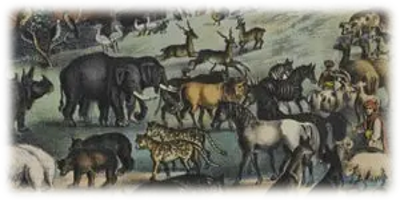"..And Adam called out names to for all the beasts, for the birds of the sky and all the living things of the field..." Genesis 2:20
The bible places a profound emphasis on the naming of every person, place or thing. What's in a name? Everything, apparently. Semites are named for the son of Noah named SHeM (name). The name is the essence of the thing, its SHAY-Ma or reputation. Commentaries have much to say about each unknown person in a list of begats and begots or each unknown, one cametotown on the journey to somewhere else. Reputation -- or name -is something to live for or die for to a Semite. No less than the supreme deity is referred to by the Jews as HaShem, The Name. The name of an animal is therefore far more than an echoic device for identification. If the chinese call a cat something like a meow (it sounds much like it) and if we've named a bird a Chickadee (after its call) --these are sure signs that the creature was not named at Eden by our first human ancestors.
None of the animals are so specialized that a sub-species is named in the bible. All primordial animal names are generic: Bird or Raven, and even the "children of the raven" (Psalms ) --but never Crow, Blackbird or Grackle. Gen 2:19-20 Seals in Middle East? SEECATCH. Otherwise, general terms like /TSAKHAN so the Algonquin Indians could name their stinker (the skunk).
"Who Named the Animals?" Where did animal names come from? According to the bow-wow theory, all words are echoic, some grunting caveman's attempt to capture the essence of a thing by it's sound. Among the many thousands of animal names, however, only a few creatures like the chickadee have an echoic name. Even in Chinese, where the cat word sounds like "meow meow," echoic names are the exception. A larger set of animal names are clearly descriptive, like the grasshopper or hippopotamus (Greek for river horse). Most of the older, more generic animal names have unknown origins, suggesting that the bow-wow theory is for the dogs. Now the world's oldest etymological text is the last place that an academic would look, but Genesis 2:20 relates that "Adam called out names for all the beasts, for the birds of the sky and all the living things of the field..." Let us see if Biblical Hebrew offers any insights into animal names of unknown origin and meaning.
The carrion-eating BUZZARD is traced only as far back as Old French busart, a word without apparent cognate or meaning. In Hebrew, BuZ means a hawk and BeeZa spoils (of war). BoZeZ would mean the plunderer or looter, while a BuZiaR is a falconer. Unlike the EAGLE (from oKHeL, to eat or destroy), the BUZZARD is merely a scavenger who emBeZZles WaSte or BooTy. (These BZ, BT and W-ST words are related to our Bet-Zayin family of words of plunder).
The Kiowa plains Indians named this same bird a bosen for good reason. If you think the GIRAFFE is a strange animal, check out its wierd (given) etymology. French girafe and Italian giraffa is aid to be a corruption of Arabic zirafah, although the term is meaningless is Arabic too and a G from a Z corruption is unnatural.. Using Emetology instead of etymology, one could suppose that zirafah is a common jumble (called metathesis in linguistics and relat! ed to the neurological disorder called dyslexia) of Hebrew [T]ZaVaR (neck). While Adam or any ancient human would do well to call the GIRAFFE a "neck" creature, the Hebrew term stresses the throat or front of the neck rather than the GIRAFFE's prominent back or scruff of the neck. The Hebrew for this part of the anatomy is OReF, more correctly pronounced by Sephardim as KHoReF or GHoReF. Now we've got the perfect sound and sense for GIRAFFE, since GHoReF means the scruff of the neck. Like SCARF, SCRUF is a neck word whose initial S is non-historic.
Any word with more than 3 root letters in Hebrew or any language is carrying extra baggage around the root or roots. These CRF neck words come from Biblical Hebrew KHoReF (neck) just like the CRAVat (necktie). A related Gimel-Resh term, GaRoN (throat, neck) gives us other long-necked animals, like the CRANE, EGRET and HERON, along with neckwear like the GORGEOUS GORGET, the throaty GROAN of a CROONer and the GARGLING of a GOURMET GARGOYLE.
Returning to animals and addressing the interchangeable C/G/H/K sounds above, both the Hebrew Ayin and the Gimel are gutturals that can harden to make the hard C of Latin corvus (raven) and French corbeau (raven) or soften to make the soft H of Anglo-Saxon hraefn (raven). Do these disparate Indo-European cousins meet when linked to a common Semitic ancestor? The Hebrew raven is an OReV or KHoReBH (Ayin-Resh-Bet). Etymologists don't have to dig far to get true word origins, but they refuse to consider Hebrew. The prolific digger among American rodents (and net surfers) is the GOPHER. The given guess in our dictionaries is an attribution to French gaufre (a honeycomb or waffle). Those who dig for a true source will consider Hebrew KHoPHeR (digger).
Now a HORSE is a horse of course, and of course there is no known meaning for this term. It doesn't relate to the German horse (Pferd, a knock-off of the Hebrew PHeReD or mule) or the Latin equs (an echo of Hebrew AQeV--heel or HooF). The mystery unraveled when I noticed the similarity of HORSE and HEARSE (a funeral wagon named for an elaborate plow). Unlike their Continental forbears, the British plowed with horses instead of oxen. The horse was the plower, and plower in Hebrew is HoReS[H]. The Americans continued the awkward tradition of plowing with a horse, which needs blinders and constant attention. The God-given plowing animal is clearly the SHoRe (ox), witch innately knows how to plow a SHuRa [Ya]SHaR (straight row or SuRe SeRies). True, the ox doesn't sound like the ShoRe at all, but Aramaic constantly corrupted the Hebrew Shin to a T, later giving us the Latin taurus (bull) and Spanish toro. Reject the bull and discover a world of meaning-- with the majesty and science of! Hebrew.

Like what you’re discovering? Continue the journey from Bible reader to translator.
|






